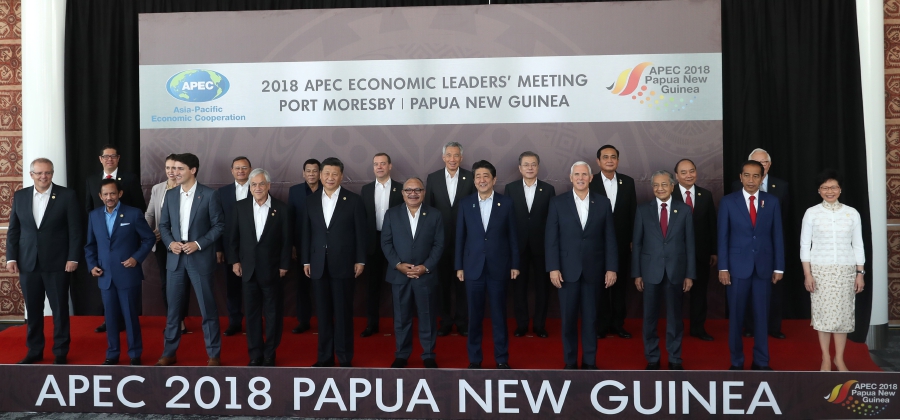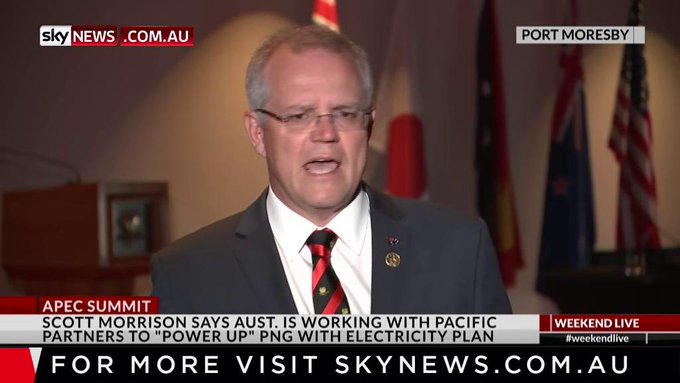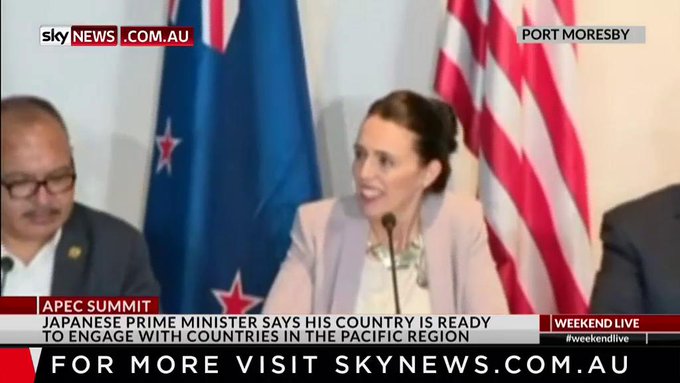

China sparks dramatic standoff at APEC as it lectures world leaders on globalism
Tensions between the US and China have erupted as the APEC summit in Papua New Guinea ended in disarray, with a dramatic split preventing the forum’s leaders from reaching a consensus position for the first time in a quarter of a century.
UPDATE: Morrison hails APEC success despite tension
Western powers united during the conference to push back against rising Chinese influence in the Pacific, gaining the upper-hand with a multi-billion-dollar pledge to “power up” the host nation and a move by the US to back a joint defence base on Manus Island.
A day after US Vice-President Mike Pence accused China of seeking to “drown our partners in a sea of debt”, the two superpowers refused to budge on three disputed paragraphs in the proposed APEC communique.
It is understood China refused to agree to language sought by the US calling for reforms to world trading rules to target predatory trade conduct and demanding state-owned enterprises be forced to compete on a level playing field with private businesses.
PNG Prime Minister Peter O’Neill referenced “the two big giants in the room” when asked why the closing communique was not drawn up, saying that “reform of the World Trade Organisation” was the main sticking point. However, he said that issue was outside APEC’s remit. It is the first time since 1993 that a leaders’ communique has not been issued after the annual APEC meeting.
It also emerged yesterday that four Chinese officials were escorted by security from PNG Foreign Minister Rimbink Pato’s office after seeking private talks to influence the wording of the official statement.
On the final day of the summit, Australia, the US, Japan and New Zealand confirmed they would fund a massive electricity and fibre-optic rollout, connecting 70 per cent of Papua New Guineans to reliable power and internet by 2030. Only about 13 per cent of PNG’s 8.5 million people have reliable access to electricity or the internet.
The investment will be the first under Australia’s new trilateral infrastructure fund with the US and Japan, which is aimed at countering surging debt diplomacy under Chinese President Xi Jinping’s signature Belt and Road Initiative.
It is understood Australia is likely to lead the transformational project — foreshadowed by The Australian last week — while contributing at least $300 million to delivering the massive infrastructure rollout in one of the world’s most rugged and inaccessible countries.
Scott Morrison said the project, part of his government’s new Pacific “step-up”, reflected Australia’s “deep-seated family commitment” to PNG and its people.
“It goes beyond economics, it goes beyond trade, it goes beyond everything,” the Prime Minister said. “They know they will always be able to rely on us.”
Last night, Mr Morrison announced that Australia was enhancing its security ties with Vanuatu, through significant infrastructure upgrades for the country’s police force, as well as training for more than 300 of its new police recruits.

Australia also hit back at a Chinese move to give PNG politicians and diplomats reciprocal visa-free travel between the two countries, announcing a multi-year, multi-entry travel card for Pacific-nation politicians, business travellers and sports people. Mr Morrison revealed the visa arrangements, to be introduced by July next year, at talks with Pacific Island Forum leaders who later attended a “family barbecue” hosted by the Prime Minister at the Australian high commissioner’s residence.
Mr Morrison also opened an Australian-funded building at the University of Papua New Guinea yesterday, where he was greeted by cheering staff and students.
Australian Strategic Policy Institute executive director Peter Jennings said there had been a “concerted push” by Australia and its allies to re-engage with PNG and the Pacific more broadly at APEC through practical development assistance.
He said historically speaking it was a big show of force, noting the last time the Americans were interested in Manus from a military point of view was in the early 1940s.
“It’s very significant and particularly valuable you have the US Vice-President really deepening American engagement in this part of the world at exactly the same time the President (Donald Trump) is talking about retrenching from NATO or from Western Europe. What that shows is America thinks differently about its role in the Pacific, it wants to do more,” Mr Jennings said.
“It wasn’t coincidental (these announcements were made) when China is trying to become the dominant strategic player in the Pacific. Frankly, it’s in our interest and it’s in the interest of the islands that there are other countries they can look to — stable, non-corrupt democracies where they can get alternative help.”
Opposition foreign affairs spokeswoman Penny Wong said Labor welcomed the government’s “long-overdue recognition of the importance of the Pacific” but stressed the new commitments should be delivered with additional money and not funded at the expense of cuts to the aid budget. “PNG in particular has substantial infrastructure needs and we strongly support this initiative to work with like-minded countries to bring reliable power to the majority of the country,” Senator Wong said.
“We also support constructive US engagement in the region and welcome America’s commitment to work together with Australia and PNG on the development of the Manus naval base.”
Mr Xi raised the stakes during what was an official state visit to PNG with a major power play in Australia’s strategic backyard, sealing a $US300m ($409m) soft-loan deal with PNG, greenlighting a $1.5 billion PNG nickel mine extension, and signing off on a raft of trade and economic agreements.
Mr Xi also had private talks during the summit with six other Pacific leaders whose countries recognise China, while Mr Morrison and Mr Xi had a brief discussion building on recent talks between the Prime Minister and Chinese Premier Li Keqiang.
China was outflanked strategically and economically at the summit, as a coalition of like-minded nations worked together to undermine Beijing’s surging influence drive across the region with key agreements sought by the host nation.
Mr Pence told APEC on Saturday that the US would contribute to the expansion of the Manus Island base, in partnership with Australia and PNG: “We will work with these nations to protect sovereignty and maritime rights of the Pacific Islands as well.”
The move will ensure US and Australian access to the strategically vital deepwater port, which has a sweeping command of Australia’s maritime approaches, is big enough to accommodate aircraft carriers and has anchorage capacity for hundreds of ships.
Mr Pence also attacked China’s BRI, saying the US did not offer “a constricting belt or a one-way road”. “When you partner with us, we partner with you, and we all prosper,” he said.





No comments:
Post a Comment
Comments always welcome!